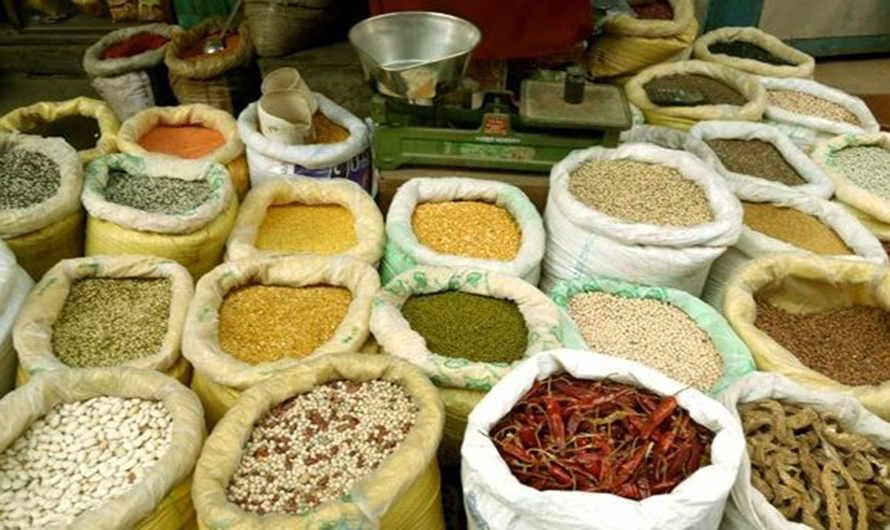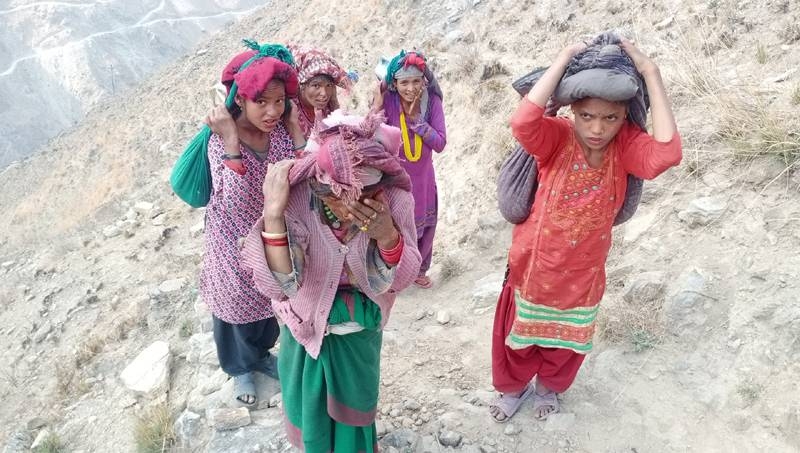
Late-night runs to Walmart in the US
It's 04:00 and the air is already sticky with the heat of a Georgia summer when Donna Martin arrives at work. Another day means another battle to get the children in her school district fed.
Ms Martin is a food service director responsible for 4,200 children, all of whom are on a federal free school meals programme.
"We have two grocery stores in our entire community of 22,000 people," she says. "It's a real food desert."
And in the past year she's been struggling to get what she needs.
Annual food inflation hit 10.9% in July, the highest it has been since 1979. As prices soar, some of Ms Martin's food suppliers are no longer interested in feeding schools.
"They're telling me: 'Ya'll are so picky, and the margins just aren't there,'" she says.
The federal school meals programme in the US is strictly regulated. That means that products like the breadcrumbs on a chicken nugget have to be wholemeal and foods must be low in sugar and salt. So Ms Martin has to source specific types of everything, from cereal to bagels or yoghurts.
She recognises that her suppliers are struggling too. A chronic labour shortage means they can't find drivers and fuel prices have increased by 60% since last year.
When suppliers don't deliver she has to be resourceful. Recently she couldn't get peanut butter, which the children love, so she replaced it with a bean dip.
"I know the kids aren't going to like it as much, but I've got to feed them something," she says.
Often she and her staff have to spend early mornings and late nights raiding the shelves of local stores such as Walmart.
"Every day for a week we had to buy the entire town out of yoghurt.
"There's a lot of kids really excited to go back to school and I don't want them saying: 'Mom, we didn't get our smoothies today.'"
Jackfruit comes to the rescue in Sri Lanka
In what was once a rice paddy just outside Kandy in central Sri Lanka, Anoma Kumari Paranathala is plucking green beans and fresh mint from the rambling foliage of her vegetable garden.
From here it's hard to imagine the chaos elsewhere in the country, as the government and economy crumble.
There are shortages of everything - medicines, fuel and food. Even people with good jobs are struggling to buy the basics.
"Now people are worried about their future," Ms Paranathala says. "They're afraid there will be nothing to eat."
The land belongs to her family. They started planting during the pandemic just for fun - now it's a matter of survival.
Ms Paranthala taught herself how to grow vegetables from books and YouTube videos. Now she has tomatoes, spinach, gourds, taro root and sweet potatoes in her garden.
Not everyone is lucky enough to have a large patch of land, but many Sri Lankans are turning to another source of food - jackfruit trees.
"In every other garden, there is a jackfruit tree," Ms Paranathala says.
"But until recently, people took no notice of jackfruit. They just fell from the trees and went to waste."
he has started making a creamy coconut curry with the fruit, substituting it for vegetables that would now be expensive to buy, or meat. Jackfruit also now appearing in kottu - a popular stir-fry dish that's sold as street food. And some people are grinding the seeds to make flour for bread, cakes and roti.
Jackfruit surfaced on the menus of hip restaurants around the world as a meat substitute a few years ago, but it took a crisis to make it popular here, where it grows.
So, what does the fruit taste like? "It's something that cannot be described," she says. "It's heavenly."
Bakeries in Nigeria are 'going extinct'
Usually Emmanuel Onuorah has little interest in politics - he's a baker and just wants to sell bread.
But recently in Nigeria, his job has become close to impossible.
"In the past year, wheat flour has gone up by more than 200%, sugar has gone up by almost 150%, eggs that we use for baking have gone up by about 120%," he says.
"We are running at a loss," he says. He's had to lay off 305 of his 350 staff. "How will they feed their families?"
As the president of the Premium Breadmakers Association of Nigeria, he's at the centre of a movement. In July, he rallied close to half a million bakers to close their doors for four days in a "withdrawal of services" action.
He was hoping the government would take notice and reduce taxes on the products they import.
A combination of bad harvests and increased demand after the pandemic caused wheat and vegetable oil prices to soar all over the world. The invasion of Ukraine made things even worse.
In Nigeria, most of the ingredients in a bakery are imported. But a loaf of bread sells for a fraction of what it does in Europe so it's much harder to absorb price increases.
The country also has an erratic public power supply, so most businesses run off private generators that burn diesel. But the price of fuel has increased by 30%. Though it's oil-rich, Nigeria has no fuel refineries and has to import all of its diesel.
Despite his costs tripling, Mr Onuorah says he can only raise his prices by 10-12%. His customers can't afford more than that.
"Nigerians are impoverished, businesses are shutting down and wages are stagnant, you can't overburden them," he says.
On average, Nigerians spend almost 60% of their income on food. In the US by contrast, that figure is closer to 7%.
Continuing like this is unsustainable for bakeries. "We're not a charitable association, we're in business to be profitable."
"But we keep trudging on," he says, "so that Nigerians can eat."
A communal pot feeds 75 people in Peru
Clambering up a scraggy path on a hill looking over the foggy city of Lima, Justina Flores is trying to figure out what she's going to cook today.
It's a problem that gets harder to solve every day.
At the height of the pandemic she got together with 60 of her neighbours to pool whatever food they had to cook. The majority of residents of San Juan de Miraflores are domestic workers - cooks, maids, nannies and gardeners - but like Ms Flores, most lost their jobs during the pandemic. Families were hungry.
They started cooking in a pot outside Justina's home, with wood they gathered for fuel. Then they built a small hut and a local priest provided a stove. Ms Flores asked market traders to donate food that would otherwise have gone to waste.
Two years later they are feeding 75 people, three times a week. Ms Flores, who worked as a kitchen assistant before Covid, has become a de facto leader in her community. "I keep knocking on doors, looking for support."
She used to make hearty stews with meat and vegetables, served with rice. But in the past few months, donations have reduced to a trickle and all types of food are more difficult to source.
"We are desperate, I've had to reduce the portions," Ms Flores says. She struggles to get basics like rice.
What began in April as protests by farmers and transport workers against the rise in the cost of fuel and fertilisers has led to a series of strikes further disrupting the food supply.
Recently, because of rising costs, Ms Flores had to stop serving meat. She had used blood, liver, bones and gizzard because they were affordable, then giblets got too expensive, and she replaced them with fried eggs. When the price of oil shot up she gave families eggs to cook at home. Now, there are no eggs either.
So today she's serving pasta with a sauce made from onions and herbs.
Ms Flores' doesn't blame the farmers for the strikes though, or shortages.
"We can grow food here in Peru but the government is not helping," she says.
A chicken boycott in Jordan
On 22 May an anonymous account tweeting in Arabic called on people to tag pictures of chicken products with the hashtag #Boycott_Greedy_Chicken_Companies.
A few days later in Jordan, Salam Nasralla was on her way home from the supermarket when she saw the campaign go viral.
"We heard about it from everywhere, all of our friends and family were talking about it. It was all over social media and TV," says Ms Nasralla.
She'd just noticed the price hike on her own shopping bill. As a mother of two who regularly cooks for her parents, sisters, nieces and nephews, she buys a lot of chicken.
She felt compelled to take part.
For 10 days she avoided chicken, but it was hard. Because other meat and fish are expensive, Salam and her family eat chicken almost every day.
They ate hummus, falafel or fried aubergine instead of meat. Twelve days after the campaign started, the price of chicken had fallen by a third, almost $1 (0.7 Dinar) per kilo.
Rami Barhoush, who manages chicken farms and slaughterhouses, supports the idea of boycotts but thinks this one was misconceived.
His farms have been struggling with rising costs since the beginning of the year, especially for fuel and chicken feed.
Global factors have combined to push up fuel and grain prices - due to factors such as China building up its pig herd after swine flu, drought in South America and war in Ukraine.
In Jordan, the government proposed a price cap on chicken but on few other products.
Chicken farmers agreed to a cap until the end of Ramadan. But in early May, they were forced to raise prices, causing a spike. Then the social media uproar began.
"Chicken represented displeasure with all of the rising prices of everything else," he says.
Ms Nasralla was glad to see the protest had an effect but worries it didn't get to the heart of the issue.
"Unfortunately it's the small farmers and chicken sellers that are hurting the most and not the big traders who put high prices on everything the farmer needs."
With inputs from BBC




1648602531_1200.jpeg)



